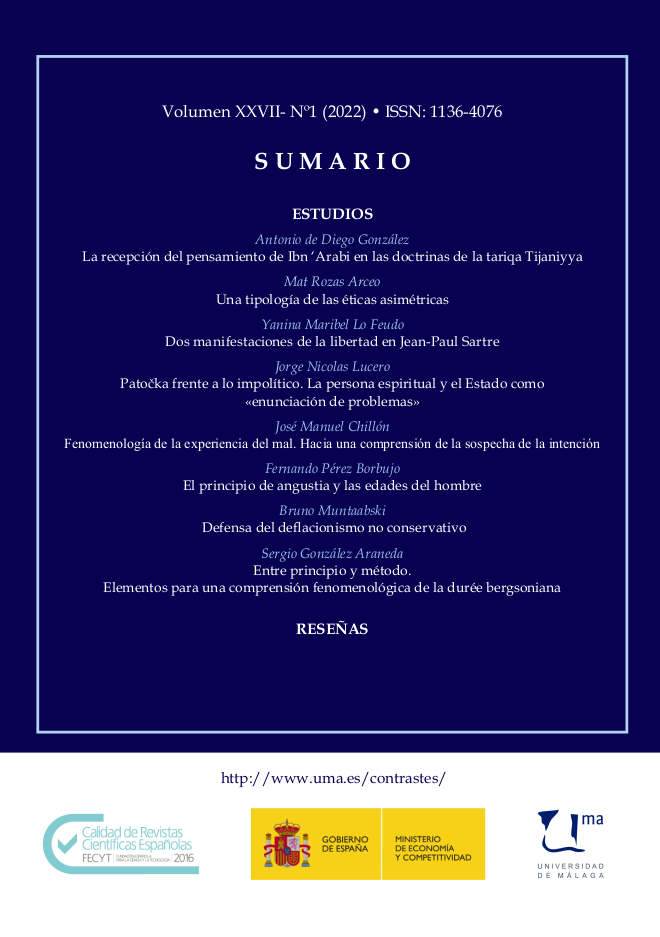Defense of non conservative deflationism
DOI:
https://doi.org/10.24310/Contrastescontrastes.v27i1.11711Keywords:
Deflationism, truth, conservativity, formal theories, natural languageAbstract
Deflationism about truth holds that a complete theory of this concept should not attend to it’s supposed underlying nature, but to the use of it in actual practice. Nevertheless, this philosophical stand on truth has been put into question by the so-called “conservativeness argument” (Murzi y Rossi, 2020), advanced originally by Shapiro (1998). A response is given to this argument in terms of the defense of a deflationism compatible with a non-conservative formal theory of truth.
Downloads
Metrics
Publication Facts
Reviewer profiles N/A
Author statements
Indexed in
-
—
- Academic society
- N/A
- Publisher
- Universidad de Málaga
References
Barrio, E. (2014). Las lógicas de la verdad. Buenos Aires: Eudeba.
Cie?li?ski, C. (2010). «Truth, Conservativeness, and Provability», Mind, 119(474), pp. 409–422.
Cie?li?ski, C. (2015). «The Innocence of Truth», Dialectica, 69(1), pp. 61–85.
Field, H. (1999). «Deflating the Conservativeness Argument», Journal of Philosophy. 96(10), pp. 533–540.
Halbach, V. (1999). «Disquotationalism and Infinite Conjunctions», Mind 108, pp. 1–22.
Ketland, J. (1999). «Deflationism and Tarski´s Paradise», Mind, 108(429), pp. 69-94.
Murzi, J. y Rossi, L. (2020). «Conservative Deflationism?», Phil Stud, 177, pp. 535–549
Shapiro, S. (1998). «Proof and Truth: Through Thick and Thin», Journal of Philosophy 95(10), pp. 493-521.
Stoljar, D. y Nic, D. (2014), «The Deflationary Theory of Truth», The Stanford Encyclopedia of Philosophy (Fall Edition), Edward N. Zalta (ed.), URL = <https://plato.stanford.edu/archives/fall2014/entries/truth-deflationary/>.
Tennant, N. (2002). «Deflationism and the Gödel Phenomena». Mind, 443, pp. 551–82.
Tennant, N. (2005). «Deflationism and the Gödel Phenomena: Reply to Ketland». Mind, 114, pp. 89–96.
Waxman, D. (2017). «Deflationism, arithmetic, and the argument from conservativeness». Mind, 126(502), 429–463.
Downloads
Published
How to Cite
Issue
Section
License
This journal provides immediate free access to its content under the principle of making research freely available to the public. All content published in Contrastes. Revista Internacional de Filosofía, are subject to the Creative Commons Attribution-NonCommercial-ShareAlike 4.0 license whose full text can be found at <http://creativecommons.org/licenses/by-nc-sa/4.0>
It is the responsibility of the authors to obtain the necessary permissions of the images that are subject to copyright.
Authors whose contributions are accepted for publication in this journal will retain the non-exclusive right to use their contributions for academic, research and educational purposes, including self-archiving or repository in open access repositories of any kind.
The electronic edition of this magazine is edited by the Editorial Service of the University of Malaga (Uma Editorial), being necessary to cite the origin in any partial or total reproduction.










5.png)
